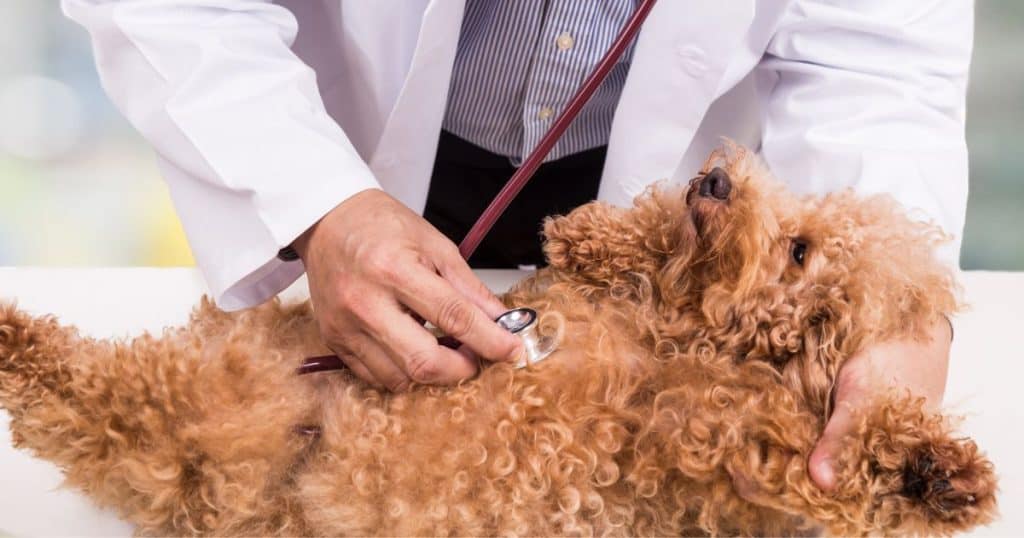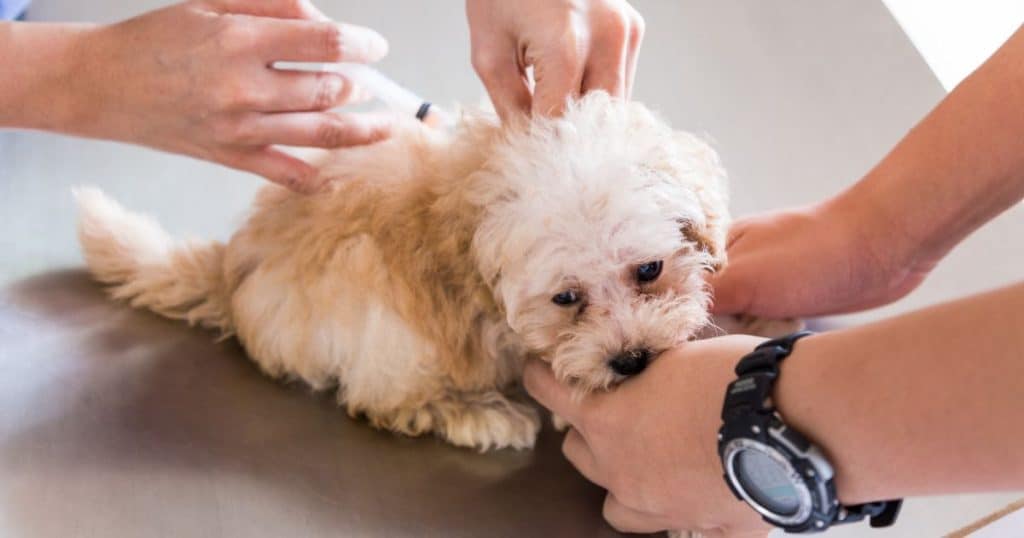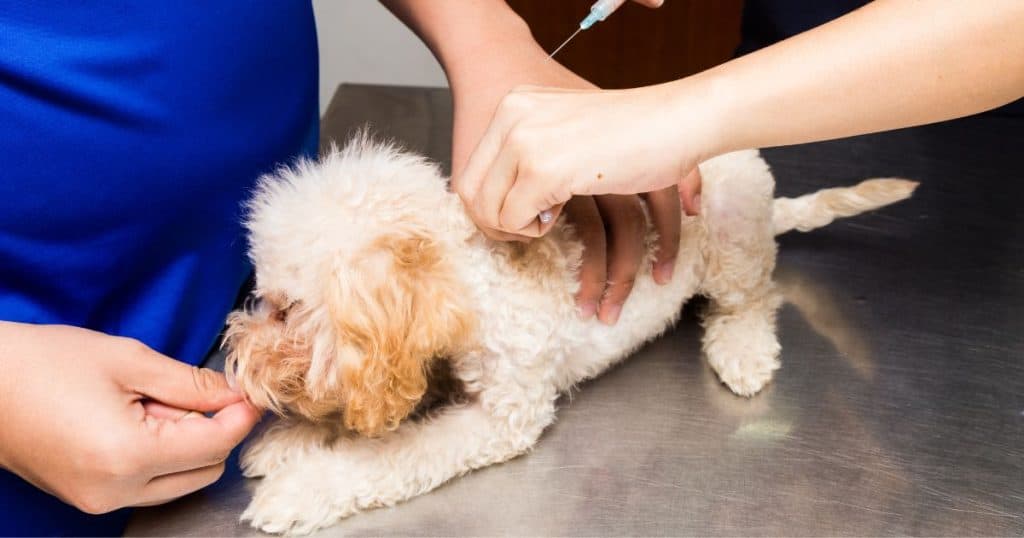What to Know
If you’re a Poodle owner, you know that these furry friends are beloved for their intelligence, charm, and affectionate nature. However, like all dogs, Poodles are susceptible to a range of health issues, including arthritis. Arthritis is a common condition that affects many dogs, and it can cause pain, stiffness, and reduced mobility. If your Poodle is showing signs of arthritis, it’s important to seek treatment as soon as possible to help manage the pain and prevent further damage.
Understanding Poodle Arthritis is the first step towards managing the condition and improving your dog’s quality of life. Arthritis in dogs is caused by inflammation of the joints, which can be triggered by a variety of factors, including injury, obesity, and disease.
In Poodles, arthritis is often seen in the hips, elbows, and knees, and it can be especially common in older dogs. Symptoms of arthritis in Poodles can include stiffness, limping, reluctance to move, and changes in behavior. If you suspect that your Poodle is suffering from arthritis, it’s important to seek veterinary care to determine the best course of treatment.
Poodle Arthritis Pain

- Arthritis is a common condition that affects many dogs, including Poodles.
- Symptoms of arthritis in Poodles can include stiffness, limping, reluctance to move, and changes in behavior.
- Seeking veterinary care is crucial to determine the best course of treatment and improve your dog’s quality of life.
Understanding Poodle Arthritis

If you own a poodle, it’s important to be aware of the possibility of arthritis. Arthritis is a joint disease that results in inflammation, pain, and stiffness. It can be caused by a variety of factors, including age, injury, obesity, or disease.
Poodles are prone to developing degenerative joint disease, also known as osteoarthritis. This is a common problem in dogs, particularly in seniors and large breeds. Although there is no cure for this condition, there are ways to manage the pain and improve your poodle’s quality of life.
The most common symptoms of arthritis in poodles include obvious pain, stiffness, or change in behavior. Your poodle may be reluctant to move or avoid certain activities. Difficulty or reluctance to stand from a lying position or difficulty going up stairs are also signs of arthritis in dogs.
If you suspect your poodle may have arthritis, the first step is to consult with a veterinarian. Your vet will perform a thorough examination, including observing your dog’s gait, conducting a physical evaluation of the joints, and possibly ordering X-rays or other diagnostic tests to confirm the diagnosis.
Prevention is key when it comes to arthritis in poodles. A healthy food and exercise regimen early in your poodle’s life is critical for the prevention of arthritis. Regular exercise helps keep your poodle’s joints healthy and strong, while a balanced diet can help prevent obesity, which can put extra stress on joints.
In summary, arthritis is a common problem in poodles and can have a significant impact on your dog’s quality of life. If you suspect your poodle may have arthritis, it’s important to consult with a veterinarian to confirm the diagnosis and develop a management plan. Prevention is key, so be sure to provide your poodle with a healthy diet and regular exercise to keep their joints healthy and strong.
Symptoms of Arthritis in Poodles

If you are a poodle owner, it is essential to be aware of the symptoms of arthritis in your furry friend. Arthritis is a common condition in dogs, and poodles are no exception. Arthritis in poodles can cause joint pain, stiffness, limping, lameness, irritability, and slowing down.
Here are some of the most common symptoms of arthritis in poodles:
- Obvious pain: If your poodle is in pain, they may cry out, whine, or whimper when moving or being touched. They may also show signs of discomfort when getting up or lying down.
- Stiffness: Arthritis can cause stiffness in the joints, making it difficult for your poodle to move around. They may have trouble getting up or lying down, or they may move more slowly than usual.
- Limping or lameness: Arthritis can cause your poodle to limp or favor one leg over the other. They may also have difficulty going up or down stairs.
- Irritability: If your poodle is in pain, they may become irritable or aggressive. They may snap or growl when touched or approached.
- Slowing down: Arthritis can cause your poodle to slow down and become less active. They may lose interest in playing or going for walks.
If you notice any of these symptoms in your poodle, it is essential to take them to the vet for an evaluation. Early detection and treatment of arthritis can help manage the condition and improve your poodle’s quality of life.
Causes and Risk Factors

Poodle arthritis is a common problem that affects many of these adorable dogs. There are several causes and risk factors that contribute to the development of arthritis in poodles.
One of the most common causes of arthritis in poodles is aging. As poodles get older, their joints become less flexible and more prone to wear and tear. This can lead to the development of arthritis, which can cause pain, stiffness, and reduced mobility.
Joint injuries are another common cause of arthritis in poodles. When a poodle experiences an injury to one of its joints, it can cause damage to the joint tissue, leading to inflammation and pain. This can increase the risk of developing arthritis in the affected joint.
Obesity is another significant risk factor for poodle arthritis. Poodles that are overweight or obese put extra strain on their joints, which can increase the risk of developing arthritis. Congenital or metabolic diseases such as hip dysplasia and diabetes can also increase the risk of developing arthritis in poodles.
Some breeds, including poodles, are more susceptible to developing arthritis than others. Large breeds, in particular, are at a higher risk of developing arthritis due to their size and weight. Genetics can also play a role in the development of arthritis in poodles.
In conclusion, arthritis in poodles can be caused by several factors, including aging, joint injuries, obesity, and genetics. It is essential to take steps to prevent arthritis in poodles, including maintaining a healthy weight, providing regular exercise, and seeking prompt veterinary care for joint injuries.
Diagnosis of Arthritis in Poodles

If your poodle is showing signs of arthritis, it is important to take them to a veterinarian for a physical exam. A veterinarian can perform a thorough examination and take X-rays to determine if your poodle has arthritis.
During the physical exam, the veterinarian will look for signs of pain, stiffness, or discomfort in your poodle’s joints. They may also manipulate your poodle’s joints to see if they are swollen or painful.
X-rays can help confirm the diagnosis and determine the severity of the arthritis. The X-rays can show if the joints are misaligned, if there is any bone damage, or if there are any bone spurs.
It is important to note that some infections can mimic the symptoms of arthritis, so the veterinarian may also test for infections to rule out any other potential causes of your poodle’s symptoms.
If your poodle is diagnosed with arthritis, the veterinarian may recommend a treatment plan that includes medication, supplements, weight management, and exercise. It is important to follow the veterinarian’s recommendations to help manage your poodle’s pain and improve their quality of life.
In summary, if you suspect that your poodle may have arthritis, it is important to take them to a veterinarian for a physical exam. The veterinarian can perform a thorough examination and take X-rays to determine if your poodle has arthritis and recommend a treatment plan to help manage your poodle’s pain and improve their quality of life.
Impact of Arthritis on Poodles

Arthritis is a painful and debilitating condition that affects many dogs, including Poodles. As a Poodle owner, it is important to understand the impact that arthritis can have on your pet’s quality of life, mobility, behavior, limbs, discomfort, swelling, and weakness.
Arthritis can significantly reduce your Poodle’s quality of life. The pain and discomfort associated with arthritis can make it difficult for your pet to enjoy activities that were once pleasurable. Your Poodle may become less active, which can lead to weight gain and further exacerbate the condition.
Mobility is another area that can be impacted by arthritis. Your Poodle may have difficulty moving around, especially when getting up or lying down. Climbing stairs and jumping up may also become a challenge. This can make it harder for your pet to get exercise, which can lead to further health problems.
Arthritis can also affect your Poodle’s behavior. Your pet may become irritable or aggressive due to the pain and discomfort associated with the condition. They may also become less social and prefer to spend more time alone.
The limbs are one of the areas most affected by arthritis. The joints in your Poodle’s limbs can become swollen and painful, making it difficult for them to move around. This can lead to a loss of muscle mass and strength, which can further exacerbate the condition.
Discomfort and swelling are common symptoms of arthritis in Poodles. Your pet may experience pain and discomfort when moving, and the affected joints may become swollen and stiff. This can make it difficult for your pet to perform everyday activities, such as walking and running.
Finally, weakness is another symptom of arthritis in Poodles. Your pet may become weaker due to the pain and discomfort associated with the condition. This can make it harder for them to perform everyday activities, such as climbing stairs and jumping up.
In conclusion, arthritis can have a significant impact on your Poodle’s quality of life, mobility, behavior, limbs, discomfort, swelling, and weakness. As a responsible pet owner, it is important to be aware of the symptoms of arthritis and take steps to manage the condition to ensure your pet’s overall health and well-being.
Managing Arthritis in Poodles

As a poodle owner, it is essential to know how to manage arthritis in your furry friend. Fortunately, there are several ways to help your poodle manage arthritis pain and stay comfortable.
Weight Management
One of the most effective ways to manage arthritis in poodles is through weight management. Excessive weight puts extra strain on your poodle’s joints, which can exacerbate arthritis pain. Therefore, it is crucial to ensure that your poodle maintains a healthy weight.
Exercise
While it may be difficult for arthritic poodles to exercise, it is still essential to keep them active. Low-impact exercises such as swimming and walking can help improve joint mobility and reduce pain. However, it is crucial to consult with your veterinarian before starting any exercise regimen.
Stairs
Stairs can be challenging for arthritic poodles, so it is best to limit their use. Consider installing a ramp to help your poodle navigate stairs more easily.
Physical Therapy
Physical therapy can help improve your poodle’s joint mobility and reduce pain. Your veterinarian may recommend a physical therapist who can develop a customized exercise plan for your poodle.
Proper Nutrition
Proper nutrition is essential for managing arthritis in poodles. Feeding your poodle a balanced diet rich in omega-3 fatty acids can help reduce inflammation and improve joint health.
Love and Care
Finally, providing your poodle with love and care can go a long way in managing arthritis pain. Regular grooming and massage can help improve joint mobility and reduce pain. Additionally, spending quality time with your poodle can help reduce stress and improve their overall well-being.
By following these tips, you can help your poodle manage arthritis pain and stay comfortable. Remember to always consult with your veterinarian before starting any new treatment or exercise regimen.
Nutritional Support for Poodles with Arthritis

Proper nutrition is essential for managing arthritis in poodles. Inadequate nutrition can lead to the development of arthritis in dogs. Therefore, it is crucial to provide your poodle with a well-balanced diet that contains all the necessary nutrients.
One of the best ways to support your poodle’s joint health is by including joint supplements in their diet. Glucosamine and chondroitin are two popular supplements that can help improve joint health. Glucosamine helps to repair damaged cartilage, while chondroitin helps to prevent further damage to the cartilage. Joint supplements can be found in different forms, such as tablets, chews, and powders, and can be easily added to your poodle’s diet.
Another way to support your poodle’s joint health is by providing them with a diet rich in omega-3 fatty acids. Omega-3 fatty acids have anti-inflammatory properties that can help reduce joint pain and inflammation. Foods that are high in omega-3 fatty acids include fish, flaxseed, and chia seeds.
Antioxidants are also essential for maintaining joint health in poodles with arthritis. Antioxidants help to reduce inflammation and oxidative stress in the joints. Foods that are high in antioxidants include blueberries, spinach, and green tea.
Green-lipped mussel is another supplement that can help improve joint health in poodles with arthritis. Green-lipped mussel contains omega-3 fatty acids, glucosamine, and chondroitin, making it an excellent all-in-one supplement for joint health.
Finally, it is essential to provide your poodle with a healthy diet that is low in fat and high in nutrition. Feeding your poodle a diet that is high in fatty or sweet treats, or lower-grade dog food, can lead to obesity and worsen arthritis symptoms. Therefore, it is crucial to provide your poodle with a well-balanced diet that contains all the necessary nutrients.
In summary, proper nutrition is essential for managing arthritis in poodles. Joint supplements, omega-3 fatty acids, antioxidants, green-lipped mussel, and a healthy diet can all help improve joint health in poodles with arthritis. By providing your poodle with the right nutrition, you can help reduce their joint pain and improve their overall quality of life.
Medical Treatments for Poodles with Arthritis

If your poodle has arthritis, there are several medical treatments that your veterinarian may recommend to help manage their pain and improve their quality of life. These treatments can include medication, surgery, and other options.
One of the most common types of medication used to treat arthritis in dogs is non-steroidal anti-inflammatory drugs (NSAIDs). These drugs can help reduce inflammation and pain in the joints. However, it is important to follow your veterinarian’s dosage instructions carefully, as NSAIDs can have side effects if not used correctly.
Another medication that may be prescribed for poodles with arthritis is a disease-modifying osteoarthritis drug (DMOAD). These drugs can help slow the progression of arthritis and protect the joints from further damage.
In some cases, surgery may be necessary to treat arthritis in poodles. This can include joint replacement surgery or other procedures to repair or stabilize damaged joints.
Other treatment options for poodles with arthritis can include physical therapy, weight management, and alternative therapies such as acupuncture or massage. Your veterinarian can help you determine the best treatment plan for your poodle based on their individual needs and condition.
It is important to work closely with your veterinarian to manage your poodle’s arthritis and ensure they are as comfortable and pain-free as possible. With the right treatment plan, many poodles with arthritis can continue to lead happy and active lives.
Alternative Therapies for Poodles with Arthritis

In addition to traditional veterinary care, alternative therapies may help ease the pain and discomfort associated with arthritis in Poodles. While these treatments may not work for every dog, they can provide relief for some and improve their overall quality of life.
Acupuncture
Acupuncture involves inserting thin needles into specific points on the body to stimulate nerves and muscles. This can help reduce pain and inflammation and improve mobility. While there is limited scientific evidence to support acupuncture’s effectiveness, many pet owners report positive results.
Massage
Massage can help increase circulation and reduce muscle tension, which can relieve pain and improve mobility. It can also help reduce stress and anxiety, which can exacerbate arthritis symptoms. Pet owners can learn basic massage techniques from a veterinarian or a professional animal massage therapist.
Hydrotherapy
Hydrotherapy involves exercising in water, which can reduce stress on the joints and improve mobility. It can also help build muscle strength and endurance, which can improve overall health and well-being. Hydrotherapy can be done in a pool or a specially designed underwater treadmill.
MSM
MSM (methylsulfonylmethane) is a natural supplement that may help reduce inflammation and improve joint health. It is often used in combination with other supplements, such as glucosamine and chondroitin, to provide comprehensive joint support. While there is limited scientific evidence to support its effectiveness, many pet owners report positive results.
Alternative therapies can be a valuable addition to traditional veterinary care for Poodles with arthritis. If you are considering alternative therapies for your dog, be sure to consult with a veterinarian first to ensure that they are safe and appropriate for your pet’s specific needs.
Preventing Arthritis in Poodles

As a pet owner, you want to ensure that your poodle lives a long and healthy life. One way to do this is by preventing arthritis, a common condition that affects poodles as they age. Here are some tips to help prevent arthritis in your poodle:
Age
As your poodle ages, their joints can become stiff and painful. While you can’t stop your poodle from getting older, you can take steps to keep them healthy. Regular exercise and a healthy diet can help keep your poodle’s joints healthy and reduce the risk of arthritis.
Weight
Excess weight can put extra strain on your poodle’s joints, increasing the risk of arthritis. Make sure your poodle maintains a healthy weight by feeding them a balanced diet and providing regular exercise.
Exercise
Regular exercise is essential for keeping your poodle’s joints healthy. Exercise helps to strengthen the muscles around the joints, reducing the strain on the joints themselves. Make sure your poodle gets plenty of exercise every day, but be careful not to overdo it. Too much exercise can be hard on your poodle’s joints.
Nutrition
A healthy diet is essential for preventing arthritis in poodles. Make sure your poodle gets a balanced diet that includes plenty of vitamins and minerals. Consider adding supplements like glucosamine and chondroitin to your poodle’s diet to help keep their joints healthy.
Care
Proper care is essential for preventing arthritis in poodles. Make sure your poodle gets regular check-ups with their veterinarian. Regular check-ups can help catch arthritis early, when it’s easier to treat. Additionally, make sure your poodle’s living environment is safe and comfortable. Provide a soft, supportive bed for your poodle to sleep on, and make sure they have plenty of space to move around.
By following these tips, you can help prevent arthritis in your poodle and ensure they live a long and healthy life. Remember, prevention is key when it comes to arthritis, so start taking steps to keep your poodle’s joints healthy today.
FAQs
What are the common symptoms of arthritis in dogs?
Arthritis in dogs can present itself in many ways, but the most common symptoms include stiffness, limping, and difficulty getting up or lying down. Your dog may also be less active than usual, have a decreased appetite, or show signs of pain when touched in certain areas.
What are some effective treatments for arthritis in dogs?
There are several treatments available for arthritis in dogs, including medication, physical therapy, and surgery. Nonsteroidal anti-inflammatory drugs (NSAIDs) are often prescribed to help reduce inflammation and pain. Physical therapy can help improve joint mobility and reduce pain. In severe cases, surgery may be necessary to repair or replace damaged joints.
How can I help manage my dog’s arthritis pain?
There are several ways to help manage your dog’s arthritis pain. Providing a comfortable bed and making sure your dog has a warm, dry place to rest can help alleviate pain. Gentle exercise, such as short walks or swimming, can also help keep your dog’s joints moving and reduce stiffness. Weight management is also important, as excess weight can put additional stress on your dog’s joints.
Are there any new developments in arthritis treatment for dogs?
Research into new treatments for arthritis in dogs is ongoing, with several promising options on the horizon. Stem cell therapy and platelet-rich plasma therapy are two emerging treatments that show potential for reducing inflammation and promoting healing in damaged joints.
What is the life expectancy of a dog with arthritis?
The life expectancy of a dog with arthritis depends on several factors, including the severity of the condition and the dog’s overall health. With proper treatment and management, many dogs with arthritis can live happy, fulfilling lives.
What are some ways to prevent or slow down the progression of arthritis in dogs?
Prevention and early intervention are key to slowing down the progression of arthritis in dogs. Maintaining a healthy weight and providing regular exercise can help keep your dog’s joints healthy. Feeding your dog a balanced diet rich in omega-3 fatty acids can also help reduce inflammation. Regular check-ups with your veterinarian can help catch arthritis early and allow for prompt treatment.

